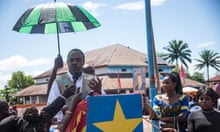Officials in the Democratic Republic of the Congo have said the Ebola outbreak in the vast central African country has entered “a new phase” after a case of the deadly virus was detected in the north-west city of Mbandaka.
The first urban case significantly escalates the risk of an epidemic, and has prompted the UN World Health Organization to convene an emergency committee on Friday to consider the danger of the disease spreading to other countries.
Late on Thursday, the country’s ministry of health announced 11 new confirmed Ebola cases and two deaths, taking the total number of cases to 45 (14 confirmed, 10 suspected, 21 probable). The deaths have occurred in Bikoro, a rural area about 150km from Mbandaka.
So far, the deaths believed to have been caused by the outbreak have been detected in more isolated areas, giving authorities a better chance of ring-fencing the virus.
The WHO’s expert committee will decide whether to declare a “public health emergency of international concern”, which would trigger more international involvement, mobilising research and resources, the WHO spokesman Christian Lindmeier said on Thursday.
The agency, which on Wednesday deployed the first experimental vaccines in the vast central African country, expressed concern about the disease reaching Mbandaka.
The city of a million is located on the banks of the Congo river, a major thoroughfare for trade and transport into Kinshasa, though experts said that transport on the river from Mbandaka to the capital could take several weeks, slowing any potential spread of the disease. Air transport is limited and very expensive.
“We are entering a new phase of the Ebola outbreak that is now affecting three health zones, including an urban health zone,” Oly Ilunga Kalenga, the health minister, said in a statement on Wednesday evening. “Since the announcement of the alert in Mbandaka, our epidemiologists are working in the field to identify people who have been in contact with suspected cases.”
Kalenga said authorities would intensify population tracing at all air, river and road routes out of the city.
“We estimate that more than 300 people might have been in direct or indirect contact with individuals contaminated with the Ebola virus in Mbandaka,” the AFP news agency quoted one doctor in the city.
There were signs of panic in the Mbandaka by mid-afternoon.
“I’m looking for a boat to leave,” said Constantine Boketshu, a soldier’s wife. “If the authorities have allowed the disease to arrive here, we all risk being killed ... because hygiene is bad.”
It is the ninth time Ebola has been recorded in Congo since the disease made its first known appearance near its northern Ebola river in the 1970s. The disease is most feared for the internal and external bleeding it can cause in victims owing to damage done to blood vessels.
In the frontline of the fight against the disease is a newly developed vaccine. The first batch of over 4,000 shots was sent by the WHO to Kinshasa on Wednesday. The health ministry said vaccinations would start by early next week.
The vaccine, developed by Merck, is still not licensed but proved effective during limited trials in west Africa in the biggest-ever outbreak of Ebola, which killed 11,300 people in Guinea, Liberia and Sierra Leone from 2014 to 2016.
Before the latest confirmed case, Peter Salama, the WHO’s deputy director general for emergency preparedness and response, said the current number of suspected, probable or confirmed cases stood at 42. He said another 4,000-vaccine batch was expected soon.
Health workers have identified 432 people who may have had contact with the disease, the WHO said.
Supplies sent to Congo included more than 300 body bags for safe burials in affected communities. The vaccine will be reserved for people suspected of coming into contact with the disease, as well as health workers.
The vaccine requires storage at a temperature between -60C and -80C, tricky in a country with unreliable electricity.
“We are now tracing more than 4,000 contacts of patients and they have spread out all over the region of north-west Congo, so they have to be followed up and the only way to reach them is motorcycles,” Salama said.
Ben Shepherd, an expert on the DRC at London’s Chatham House, said the country had managed earlier outbreaks of the disease “pretty well”.
“The lack of infrastructure can act as a natural firebreak slowing the spread of the disease. But the cities have very little planning, water, sanitation or electrification. If Ebola was to reach Kinshasa, it would be beyond apocalyptic,” he said.









